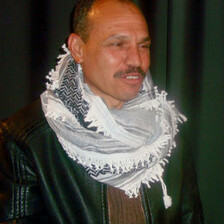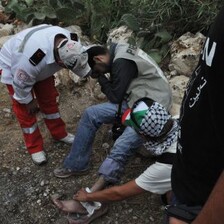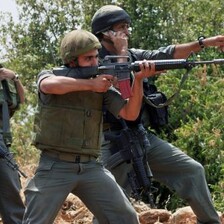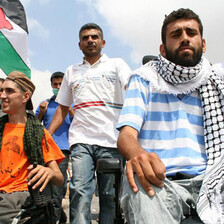
A young Palestinian boy protests in Bilin against the Israeli army arresting a videographer from the village, October 2006. (Oren Ziv/ActiveStills)
Every Friday, Palestinian residents of the West Bank village of Bilin march to Israel’s apartheid wall, which has stolen more than half their land. But this day was a Wednesday, and the kids’ turn to demonstrate.
It was a beautiful morning, the perfect time to add a new element to the nonviolent resistance in Bilin. While the Israeli army kidnaps their fathers, their brothers and their cousins, the resistance lives on through the next generation.
When I asked Iyad Burnat, member of the Bilin Popular Committee, who would be leading us to the wall today, he said, “Our children are strong! After all, who will be making the demonstrations when we are all in jail?” I could tell that he was only half joking.
We gathered in the middle of the village as usual, a familiar setting with an unfamiliar crowd. It must be the first demonstration I’ve been to where the average age was in the single digits. Their messages were clear and written on the home-made signs they proudly held in the air: “We Want To Sleep!”
During the last couple of months, the people of Bilin have been victims of constant night raids by the Israeli military, in an obvious attempt to crush the nonviolent resistance which the village has so proudly sustained for five years now. Of course, as so often is the case with incidents of injustice and collective punishment, it is the children who suffer the most.
But the children of Bilin refuse to suffer in silence. They had resistance in their blood and souls from the moment they were born. And they know what their people are fighting for: freedom.
As we walked down the historic path from the village to the wall, I saw a few kids peeling away from the demonstration, unwilling to continue any further. It was understandable; even the bravest child would be intimidated by the sight of soldiers readying their weapons.
They’ve seen uncles die, and friends arrested and kept in jail for six months. They don’t want to be the next martyrs, however noble the cause.
It was strange to arrive at the wall so few in number, in comparison to the usual weekly demonstrations, the ground still stinking of the sewage water they sprayed us with on the previous Friday. For the children, I suspect it was a welcome release from the unimaginable frustration of living under occupation.
But for Nashmi, 15, the wait for the demonstration was too long. To venture near land that he has every right to, was something he couldn’t wait for. On Saturday afternoon, Nashmi was walking and playing with some friends near the wall when he was attacked by soldiers and taken away. “Arrested,” as the occupying forces would term it, but “kidnapped” being a more appropriate description. The soldiers were sitting under a nearby olive tree, waiting to ambush the teenagers.
With this memory fresh in their minds, the chanting was impassioned: “FREE! FREE! NASHMI!
With the gate that separated us from the wall opened, two brave young boys began to cautiously approach, one of them (at that moment, a spitting image of his father) with a loudspeaker in hand, chanting proudly. However, the waving guns prevented them from continuing.
But despite the threatening gestures, no shots were fired. Instead, the Israeli soldiers physically confronted us on foot, forced the children back behind the gate, and re-closed that ugly symbol of oppression. A big yellow gate that separates Palestinians from their land and their freedom.
On the way back from the demonstration, we faced a new challenge: How many kids could get on my wheelchair at the same time? At one point we got to five, laughing and waving Palestinian flags, pointing two-fingered peace signs in the air.
After the demonstration, the children had a special day of fun and games in a nearby community center. It was a strong visual reminder of something that many forget: these are normal children living in an unimaginable reality of occupation and apartheid.
Jody McIntyre is a journalist from the United Kingdom, currently living in the occupied West Bank village of Bilin. Jody has cerebral palsy, and travels in a wheelchair. He writes a blog for Ctrl.Alt.Shift, entitled “Life on Wheels,” which can be found at www.ctrlaltshift.co.uk. He can be reached at jody.mcintyre AT gmail DOT com.





